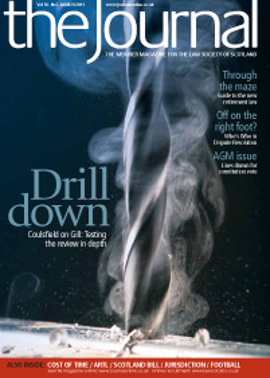Frauds and scams beware

Fraud continues to be a problem for businesses in Scotland and across the UK. Figures produced by the National Fraud Authority estimate that fraud currently costs the UK economy £38bn annually (see Journal Online, 27 January 2011). Figures in the KPMG Fraud Barometer, reported by Journal Online on 9 August 2010, for example, indicate that, in the UK as a whole, reported mortgage fraud quadrupled in value during the first half of 2010 – accounting for over 50% of all scams against the financial sector.
While much of the fraudulent activity targets the financial sector, it has the potential to impact on solicitors in a number of ways. Lack of awareness of frauds and scams exposes solicitors to heightened risk of exposure to potential liability.
Mortgage fraud
Claims by lenders against solicitors alleging breach of the reporting requirements of the Council of Mortgage Lenders (CML) Handbook remain a significant feature of the Master Policy claims experience. Many of these claims involve mortgage fraud (sometimes also identity fraud) by the borrower.
The Law Society of Scotland has been flagging risks and requirements, warning signs and good practice points for some time now. See, for example, the following guidance, which appears on the Society’s website:
Mortgage fraud guidance (excerpt)
“Organised criminals will generally involve at least one professional at the centre of the fraud, providing reassurance and direction to the others instructed to act in parts of the scheme.
“Mortgage lenders often rely on professionals to safeguard their interests and verify the legitimacy of a transaction. Some lenders have sadly taken limited steps to verify the information they receive, especially in a rising market. Self certification of income is one example of this trend.
“Solicitors are often approached with completed paperwork and packaged transactions. The lender will often have already received the loan applications, and granted the loan before they are instructed.
“The solicitor will simply be required to carry out the conveyancing work.
“The solicitor is often encouraged to complete the certificate of title at the gross price and not the actual price paid for the property after allowances and discounts, while being discouraged from complying with obligations in the CML Handbook.”
“In the wake of recent fraudulent activity involving ‘cloning’ identities of bona fide firms and solicitors, we advise firms to be vigilant and to check the internet regularly to ensure that their details are not being misused.
“We are aware that a small number of firms have had their company names used and their websites cloned by criminals, who use firms’ identities to obtain money fraudulently… The cloned websites are used in scams, usually originating from overseas, in which individuals are asked to send money in advance. This is known as advanced-fee fraud. The criminals provide their targets with details of the cloned solicitor or firm – with false contact details. The involvement of a ‘solicitor’ lends credibility to the transaction. Often, targets are asked to send money to the ‘solicitor’s’ false contact details.”
In the Society’s financial compliance update of June 2010, the President, Jamie Millar, commented: “Mortgage fraud is a genuine and significant risk to solicitors. I would urge all solicitors to be aware of the warning signs and recommendations in [this] bulletin as part of their ongoing risk management.”
The update goes on to list warning signs of potential for mortgage fraud. It urges solicitors to:
- make sure they are aware of the CML requirements (particularly clause 5.1 – surrounding circumstances) and ensure that they follow these exactly and on time. Without full and prompt disclosure of transaction details required under the CML Handbook, the lender may make a lending decision that it would not otherwise have done. Where this is the case, the lender will hold the solicitor accountable for any losses incurred.
- satisfy themselves regarding client identification at the start of the business relationship – as required by the Money Laundering Regulations 2007. Do not act until you are satisfied. Carry out a documented risk assessment and act in accordance with the identified level of risk.
- ask questions to ensure that they fully understand the transaction, including the purpose of any unusual features.
- satisfy their legal obligations to report their suspicions to the Serious Organised Crime Agency (SOCA). A Suspicious Activity Report (SAR) should be submitted as soon as a solicitor ‘knows’ or ‘suspect’ that a person is engaged in money laundering or dealing in criminal property.
- seek advice – from Professional Practice, from SOCA, from the CML.
- refrain from acting – if in doubt.
Identity theft/fraud – clients
In an article at Jourtnal, April 2008, 44, Alistair Sim of Marsh referred to experience in Canada and Australia of fraud on mortgage lenders involving identity theft. The defrauded lenders were left with worthless securities but potential claims against solicitors.
Regrettably, these situations are no longer confined to other jurisdictions. It is another type of fraud or scam of which we now have experience in Scotland.
Beware the risk of lowering your guard just because a referral has been made by a known, trusted source – perhaps another local solicitor or estate agent. In a claims bulletin, PI insurers in Canada report having seen instances where fraudsters “have signed listing agreements or agreements of purchase and sale with a real estate agent before asking the agent to provide names of recommended local lawyers”.
The source of the referral may be implicated in the fraud or scam, so it isn’t safe to rely on the fact that the referral is from a longstanding or trusted business colleague. You should:
- ensure you vet new clients carefully.
- undertake adequate anti-money laundering checks to verify the identity of the client.
- consider whether or not the transaction “makes sense”.
- question why you are being approached to act for this potential client.
It is not just identity fraud on the part of those instructing law firms that could create problems, and perhaps potential liability, for solicitors. Identity can take other sinister forms.
Identity theft/fraud – law firms
In January 2011, the Solicitors Regulation Authority (SRA) in England & Wales issued a Fraud Alert on the subject of fake law firm websites:
Imagine you are engaged in a transaction with one of these fake law firms. The transaction itself seems unremarkable but it transpires that the law firm on the other side was not a genuine firm of solicitors. How could that situation create risks for your firm? Could you incur some liability? What if you have relied on an undertaking from the fake firm?
If you are dealing with a firm that you do not know:
- consider why you are being instructed rather than a firm local to the party instructing you.
- check the law firm’s website, that their telephone numbers correspond, that the partners correspond.
- check that the firm name and partners match up with the relevant entries on their law society/regulator’s website (the SRA website, for example, prominently displays a list of suspected “fake law firms”).
Solicitors as victims
Most of the frauds and scams we have considered target a financial institution. But there is evidence, mainly from other jurisdictions, of types of fraud/scam targeting solicitors themselves. Consider the following scenario. Imagine you receive the following email:
“I am the MD of XYZ, a German company specialising in the manufacture of widgets.
“One of our customers in Scotland, ABC, owes us £100,000 and, despite having written to them on several occasions, that amount is still outstanding. We would be grateful if you would act on our behalf in raising a court action to recover the debt due to us.”
Documentation such as invoices, statements and demand letters is provided which appears on its face to be legitimate. You carry out anti-money laundering identification checks, the results of which are satisfactory. Would you have any (further) concerns in acting for the creditor?
Having decided to take on this piece of business, you proceed to take the necessary action and after correspondence with the debtor, you receive a bank draft payable to your firm, which you lodge in the firm’s client account. You report to your client who instructs you to remit the funds (less your fee) to his offshore account as soon as possible. Having remitted the funds by direct funds transfer as instructed, you are told some days later that the bank draft was counterfeit and you are faced with having to replace the shortfall in the firm’s client account.
It has been widely reported that lawyers in the US, Canada and Australia have fallen victim to this type of scam. Sometimes the bogus debt is recovered quickly; on other occasions there may be sham negotiations. Often it can take some time for the fraud to be discovered – counterfeiters use sophisticated technology.
Warnings about this type of scam have been issued by law societies in New Zealand, Ontario, Victoria, and also, nearer home, England. In fact the warning issued by the Law Society of England & Wales formed the basis of a discussion topic at the Risk Management Roadshow 2010.
A variant of the above scam, which appears to have been first noticed in New Zealand, concerns a phoney “divorcee” who lives abroad and wishes to instruct you to recover sums allegedly due under a separation agreement entered into with her ex-husband now resident in the UK.
Clearly there is a risk that Scottish solicitors will be targeted. If you are to avoid falling victim, you need to be alert to the scam, and be cautious where requested to act on behalf of foreign clients making initial contact by email or letter. To be effective, your vetting controls might include: checking the details of the client and the debtor – to verify phone numbers, addresses, etc; checking where and when the debtor, if a company, was registered; checking that the client and debtor are not linked in some way; double checking the validity of bank/account details on the cheque; holding funds until they are confirmed as “cleared”.
Conclusions:
- Ensure you keep up to date on alerts about frauds and scams.
- Consider the most effective way of ensuring colleagues also keep up to date.
- In vetting clients and transactions be alert, vigilant and report suspicions or knowledge of money laundering to SOCA.
- Consider any necessary changes to vetting checklists.
In this issue
- The case for full disclosure of laboratory case files
- Why join the Scottish Family Law Association?
- Above board
- Time to be counted
- Taking out rejections
- Updating the constitution
- Every bit helps
- Retiring the default age
- Keeping a grip on cash
- Watch this space
- The diehards
- Win-win ways
- "Virtual fair" opens for career options
- Law reform update
- Society's in-house work under scrutiny
- Watching over the constitution
- All aboard life's U-bend
- Ask Ash
- Working to advantage
- Frauds and scams beware
- Lay help... official
- Lacuna manufacturing
- This time it's NOT personal
- Fairness and trust
- Pensions: redefining value
- Sharing the spoils
- World IP Day 2011 approaches
- Life v reputation
- Book reviews
- ARTL, by degrees
- Contaminated land - the story continues






